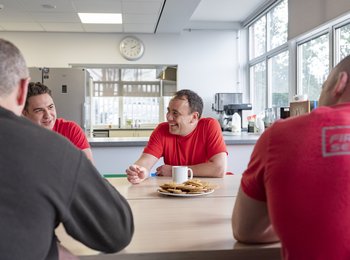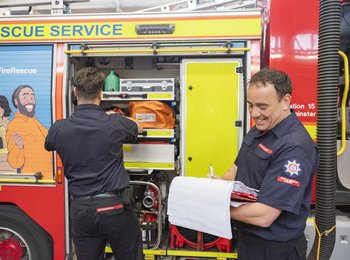Tom’s story: mental health and neurodiversity
Calling Samaritans was the best choice that I could have made in that moment. I realised that keeping that stuff locked in was making it worse...
Tom called Samaritans after struggling with suicidal thoughts. Since reaching out for help, he now hopes to raise awareness by talking openly about mental health and neurodiversity
I spent two years as a retained firefighter and then managed to get through the transfer process, which saw me take on the role full-time. I absolutely love my job and enjoy going to work every day. I only wish I’d found this career sooner, as it suits me perfectly.
Prior to working for the Fire and Rescue Service, I worked in office-based roles for 17 years. I think this contributed to a lot of my mental breakdowns. Having undiagnosed ADHD and being stuck in an office for 17 years is probably not a career choice I would have taken had I known I was neurodiverse.
I received my ADHD diagnosis a few years ago, and I think having a physical job where I’m on my feet and on the go all the time, is brilliant for me. Every time the bells go there is an adrenaline boost, as you just don’t know what type of job you are going to.

Being a firefighter is incredibly rewarding but can also be tough. It’s physically and emotionally challenging but we work in teams which helps, we call it a watch, and this is essentially an extended family. Everyone on the watch looks out for each other, it’s such a tight unit.
In the past, it sounds like the fire service was a very alpha male dominated workplace, and men were taught not to deal with their feelings. But I feel like the fire service has come on in leaps and bounds since then, with the wellbeing and mental health services that are available.
Mental health is talked about more openly, and I think it has become more acceptable to talk about anxiety and depression. There is also good mental health services provided and support after traumatic incidents. Our TRIM team (Trauma Risk Management) always get in touch when you have been to a fatality or a particularly challenging job. This is a recent initiative and one which has made a huge difference to the service.
Contacting Samaritans
I’ve lived with depression and anxiety most of my adult life, and I don’t know if it’s connected to the fact I was managing undiagnosed ADHD. Over the years, I've had several mental breakdowns. I’ve had thoughts like ‘you don’t deserve your family, they’d be better off without you’, all of those negative thoughts.
It was probably the worst in 2021, the night before my daughter was due to fly to Spain as part of her university degree. I’d been drinking a lot that evening and was self-medicating at the time. I was in a really, really dark place with no hope, and anxiety crippling me.
I experienced so much guilt for exposing myself like this and breaking down in such a bad way in front of my daughter. I don’t know if it was because she was going away that was the trigger, but there were a lot of other issues at play too, like work, finances, and not understanding what was going on in my head.
I’d disappeared into the woods near my house in the middle of the night, battling with suicidal thoughts and struggling to cope with the thoughts and feelings that were overwhelming me. Thankfully I made it back home and called Samaritans who supported me through this difficult period until I felt safe again. Calling Samaritans was the best choice that I could have made in that moment.
Tom
I remember a very kind-sounding person at the end of the phone, who just grounded me. I was still upset but not wanting to take my own life anymore. I realised that keeping stuff locked in was making it worse; I think that is what has driven me to become more open personally.

Until you get diagnosed with ADHD it’s easy to think you’re going crazy with all the many internal monologues going on at the same time. Sometimes this would overpower me, and these are the times I would really struggle mentally. My diagnosis has been incredibly validating and instrumental in my recovery.
I think some people may see it as a weakness and I don’t see it that way. I see it as the opposite. I think it’s incredibly brave to open yourself up like that.
If someone is feeling alone or in crisis, and thinking about phoning Samaritans, don’t think about it, just call them. They’re literally just there to support you. One of my hopes for the future is to be really open about my mental health and neurodiversity. My wellbeing today is up and down but mostly up.
After my own experience, I have recommended friends and colleagues contact Samaritans. You don’t have to wait until you’re suicidal, Samaritans are always there for you 24/7.
Tom
Fundraising challenge
Last year I ran a 100-mile ultra marathon, non-stop, to raise money for Samaritans. I had promised myself that I would do something for them when I was struggling with my mental health and the stars aligned when I saw the race pop up in my emails. My best friend Steven took his own life 25 years ago, which was another driver for me taking part in the challenge. I wish he had reached out to Samaritans back then.
Another driver for me to take on the challenge was down to the sheer volume of suicide attempts we deal with in the fire service. It feels this is happening more and more recently. I attended a mental health first aid course last year and they mentioned that funding for suicide prevention had been cut, so this was the final push I needed to raise money for Samaritans.
Along with gift aid, I managed to raise just over £4,000, which I’m absolutely delighted about. It was a huge team effort, and my wife and family were instrumental in this. My work colleagues and the corporate communications team were also really supportive. They managed to get me a spot on Radio Bristol. This was nerve-wracking but also a good way of telling the public all about the great work Samaritans do and how they have helped me.